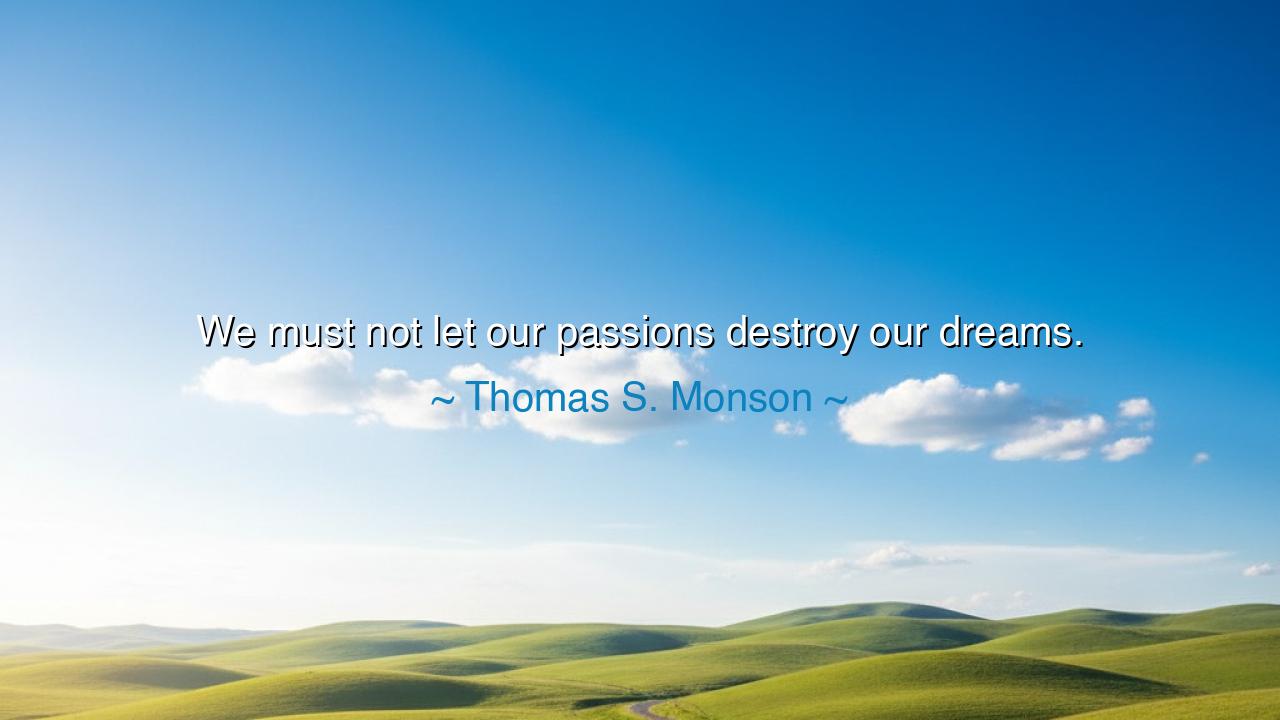
We must not let our passions destroy our dreams.






Here is an ancient-style reflection on Thomas S. Monson’s quote:
The Fire and the Star
When Thomas S. Monson said, “We must not let our passions destroy our dreams,” he spoke as one who understood the eternal battle within the human heart — the war between desire and purpose, between the fire that drives us and the light that guides us. His words carry the gravity of a prophet’s warning and the tenderness of a father’s counsel. For passions, though powerful and divine in origin, can burn too brightly and consume the very dreams they were meant to sustain.
The meaning of this teaching lies in the delicate balance between passion and discipline. Passion is the spark of creation — it gives us energy, courage, and life. Without it, the soul withers into dull obedience, and dreams lie dormant. Yet when passion grows wild and ungoverned, it becomes like fire in an open field: fierce, uncontrolled, and destructive. Dreams, on the other hand, are like stars — distant but steady, illuminating the path ahead. Monson’s wisdom reminds us that the fire must serve the star, not consume it. Passion must be the servant of purpose, never its master.
The origin of this truth reaches deep into the story of humankind. From the dawn of civilization, those who rose to greatness were not those who burned the brightest for a moment, but those who learned to temper their fire and endure through the night. History is filled with examples of those who let their passions overwhelm their reason — kings undone by greed, warriors lost to anger, lovers blinded by obsession. Yet it is also filled with those who tamed their passions, turning them into instruments of destiny. To master oneself is to command the greatest army of all.
Consider the story of Alexander the Great, who conquered nations but could not conquer his own temper. At the height of his glory, in a fit of rage, he struck down his closest friend, Cleitus — the very man who had saved his life in battle. In that single moment, his passion destroyed his dream, for his empire never recovered from the guilt that haunted him. His conquest of the world brought him no peace because he had lost the greater victory — mastery of his own soul. So it has ever been: when passion turns against purpose, even the mighty fall.
Yet, passion need not be the enemy of dreams. When guided by virtue — by patience, humility, and love — passion becomes power made pure. It is the wind in the sails of the dreamer, the pulse in the heart of the artist, the courage in the soul of the leader. The secret lies in discipline — in knowing when to let the fire burn and when to let it rest. Monson’s words, though gentle, are a call to strength: to build character strong enough to contain power without being consumed by it.
In the wisdom of the ancients, self-mastery was the highest form of freedom. The Stoic philosophers taught that the man who cannot control his desires is a slave, no matter how high his throne. So too does Monson teach that our passions must be governed by principles — for dreams are sacred, and we must not offer them to the flames of fleeting indulgence. To live rightly is to walk the narrow road where heart and mind are in harmony, where zeal serves wisdom, and ambition bows to virtue.
Therefore, O listener, take this lesson to heart: do not destroy your dreams in the heat of the moment. Guard them as treasures entrusted to your care. Let your passion move you forward, but let your conscience steer your course. When anger rises, remember your purpose; when desire blinds you, recall your goal. For the dream that endures is not the one built in frenzy, but the one nurtured in patience and faith.
And when the storms of emotion rage within you, stand firm like a mariner at the helm, eyes fixed on the distant light. For as Thomas S. Monson reminds us, the fire within you is a gift — but only when it serves your highest calling. Let passion kindle your journey, not consume it. Let your dreams rise above your desires, and you will walk the path not of chaos, but of greatness — the path where purpose conquers passion, and the soul at last finds peace.






AAdministratorAdministrator
Welcome, honored guests. Please leave a comment, we will respond soon